
Abortion on the Border
A procedure room in the closed Whole Woman's Health abortion clinic in Austin, Texas shortly after the Supreme Court of the United States' 5-3 ruling on the Whole Woman's Health v. Hellerstedt case regarding Texas' House Bill 2 on June 27, 2016. This was one of many abortion clinics to close across the state because of House Bill 2. On the wall there is a Sojourner Truth quote that reads, "The truth is powerful and it prevails."
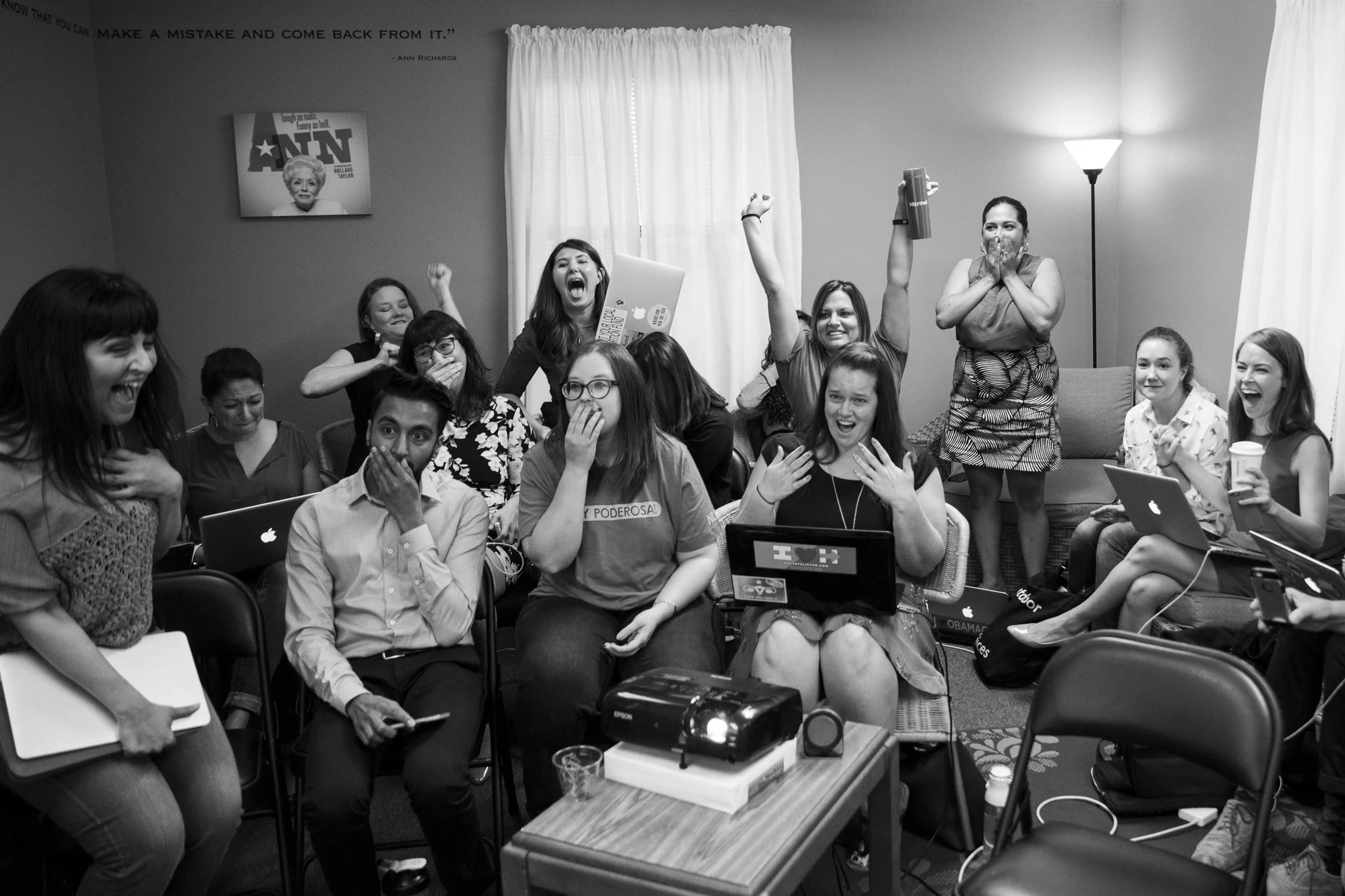
Abortion on the Border
Providers and staff with Whole Woman's Health, plaintiffs in the Whole Woman's Health v. Hellerstedt case, and women's reproductive and abortion rights advocates react to the Supreme Court of the United States' ruling in a closed Whole Woman's Health clinic in Austin, Texas on June 27, 2016. The plaintiffs argued that Texas' House Bill 2, which closed dozens of abortion clinics across Texas including this one, was unconstitutional. The Supreme Court agreed and ruled that Texas cannot place restrictions on abortion providers that pose an undue burden on women trying to access abortions. Upon hearing what is being considered the nation's most significant abortion ruling in a generation, those gathered said they hoped that closed clinics, such as this one, would be able to someday reopen because of this ruling.

Abortion on the Border
Mercedes Soto cries as she sings a hymn into a megaphone while she and more than a thousand other anti-abortion protestors face off with abortion rights advocates in the intersection in front of the Whole Woman's Health abortion clinic in McAllen, Texas on January 21, 2017. Mercedes, formerly a member of a gang in the Rio Grande Valley, was gang-raped by a rival gang. When she discovered she was pregnant because of the rape, she tried to self abort by ingesting illegal abortion pills, drinking toxic teas, and even having fellow gang members punch her in the stomach. When nothing worked, she went to Whole Woman's Health to get an abortion. She was stopped on her way in by a pro-life sidewalk counselor. Mercedes decided to keep the pregnancy and raise the child as her own. Now she tries to convince other women to do the same.
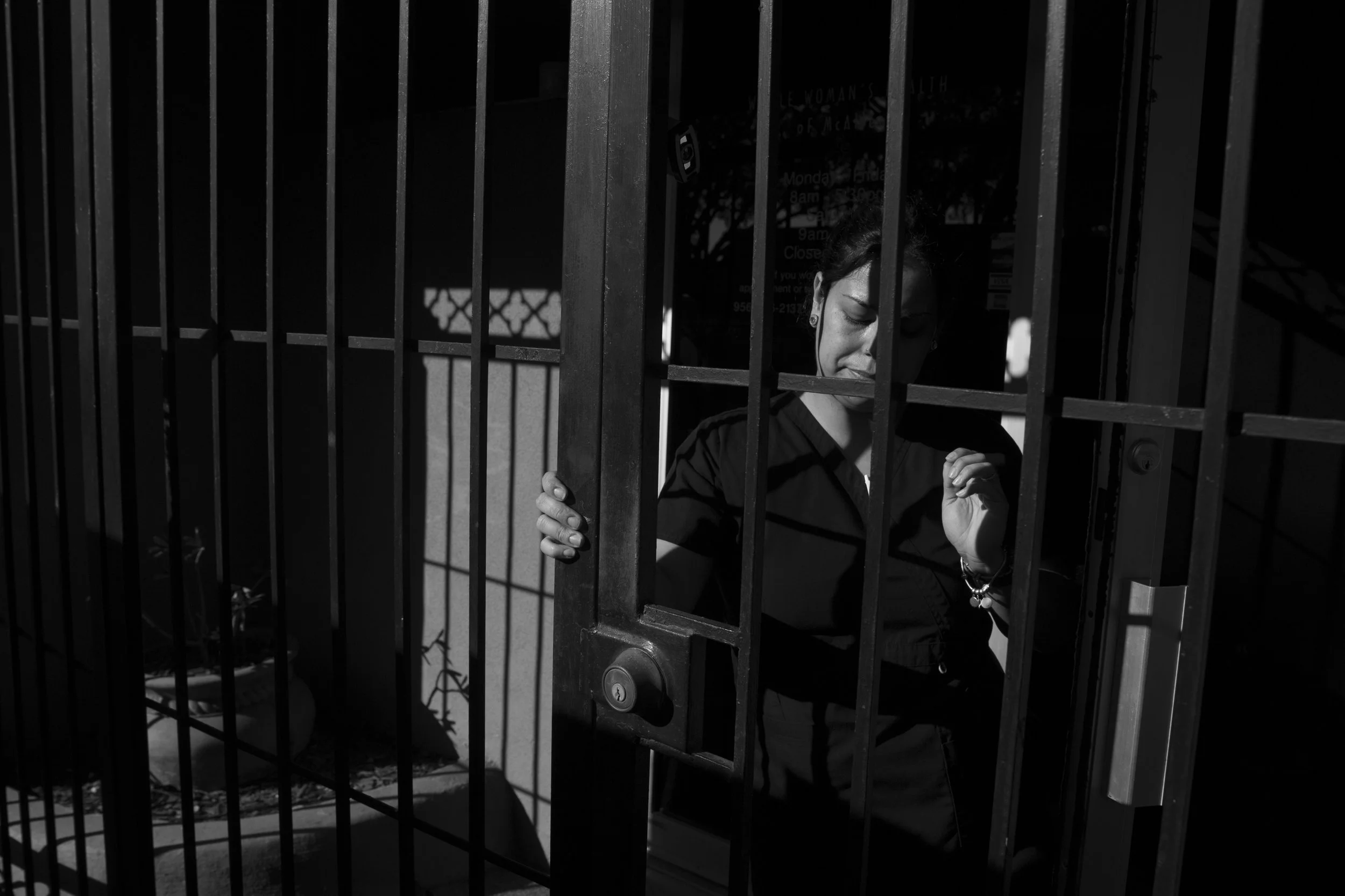
Abortion on the Border
Kristeena Banda, clinic director, closes the exterior metal gates that protect the front door of the Whole Woman's Health abortion clinic as over a thousand people protest in front of the clinic in McAllen, Texas on January 21, 2017. At one point, the McAllen clinic closed because of House Bill 2, but it was granted a temporary injunction by a federal judge to stay open, because it was the only clinic in the Rio Grande Valley.
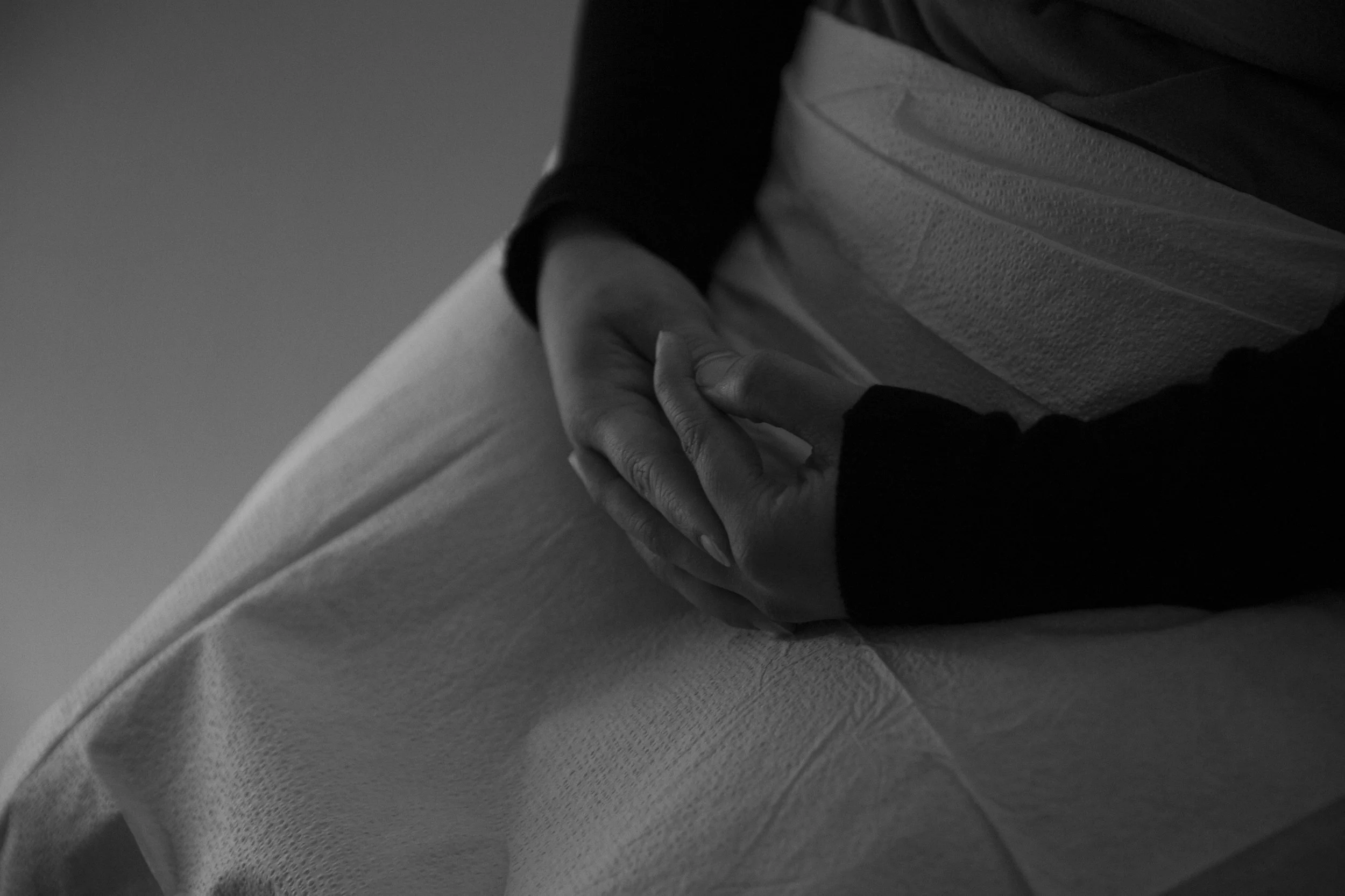
Abortion on the Border
Dr. Bhavik Kumar, one of few abortion providers in Texas, speaks to Marie before providing her a surgical abortion at the Whole Woman's Health in San Antonio, Texas on February 23, 2017. "I am a single mother to a special needs child," Marie said. "It takes a village to raise my son, so I can't imagine bringing another child into that...I feel bad about this decision, but it is for the best. It is for my son." More than 60 percent of women seeking abortions are already mothers. Marie's last name is withheld for her privacy.
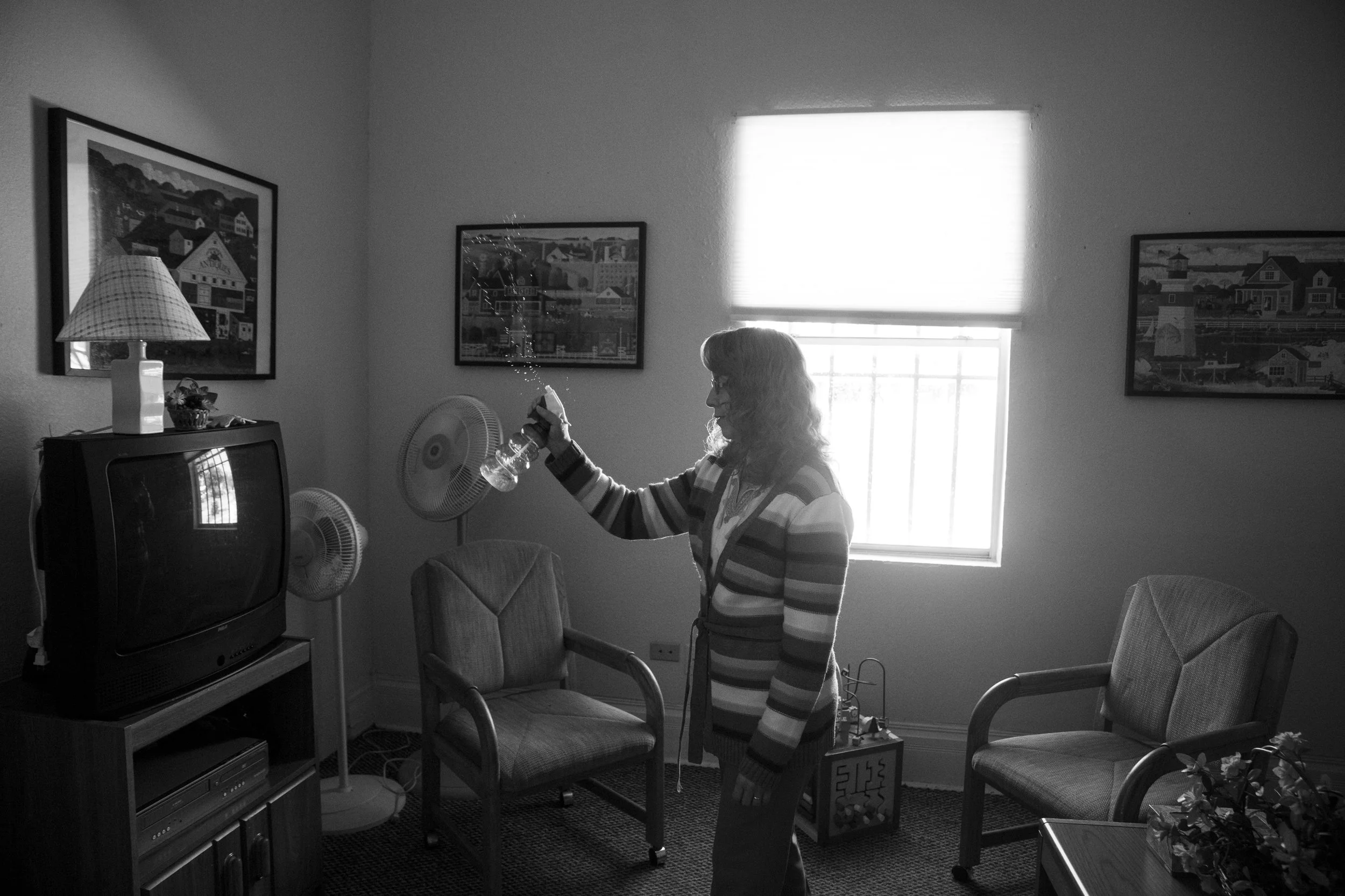
Abortion on the Border
Yolanda Perez Rittimann, a volunteer at Allied Women's Center, sprays holy water on the television they use to show a graphic anti-abortion video, which includes medically incorrect information, in order to discourage women from getting an abortion. Crisis pregnancy centers are religious organizations that usually do not have medical professionals, but do provide pregnancy tests and ultrasounds and discourage women from getting abortions. In Texas, some of them, not including Allied Women's Center, receive state funding.
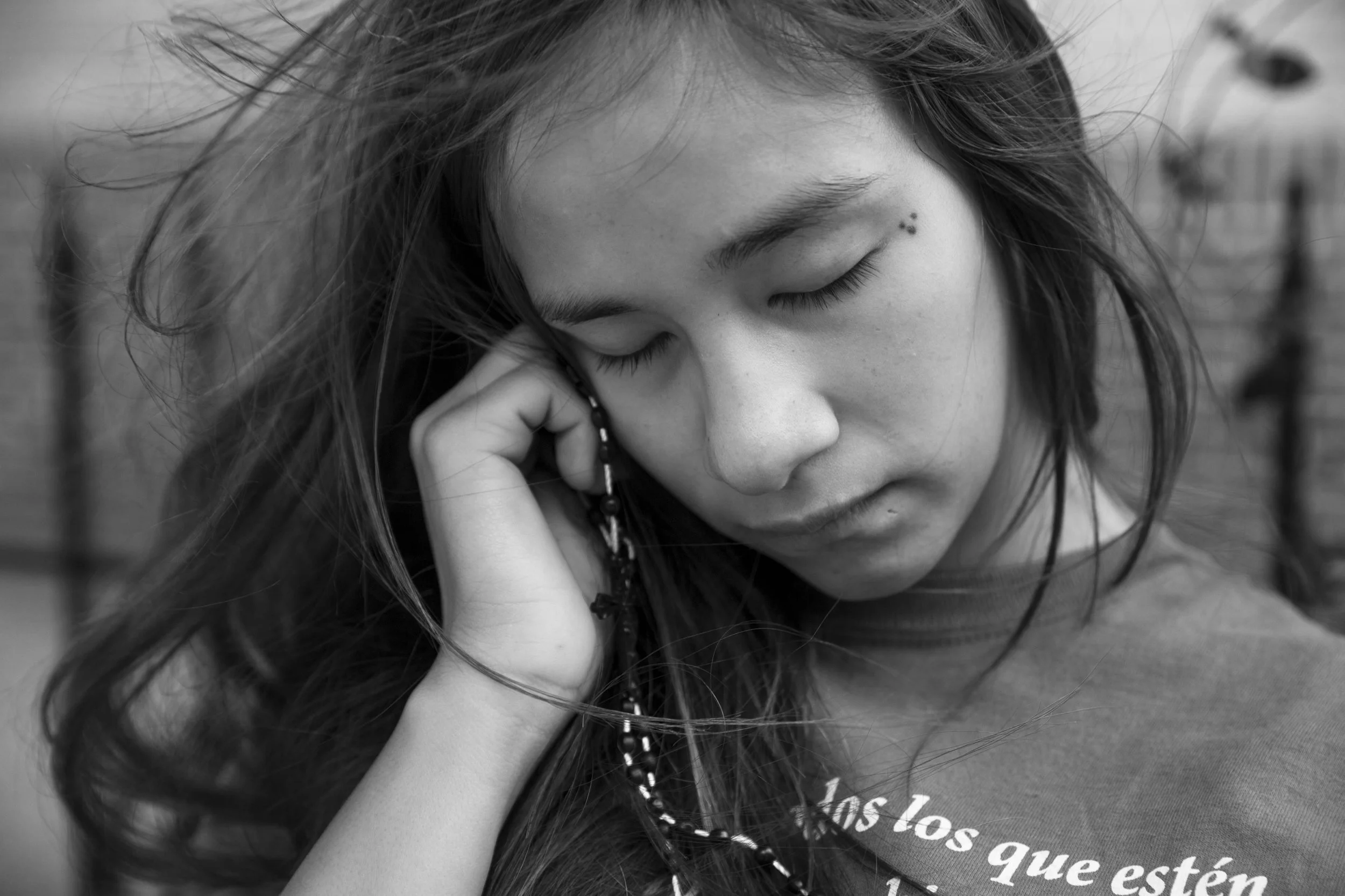
Abortion on the Border
Mercedes Soto prays with Patricia De Leon, who was due to give birth in September, outside the Sacred Heart Church in McAllen, Texas on June 1, 2017. They were praying for Patricia to find a safer and more secure place to live by the time the child is born in the fall, Patricia said. Mercedes helped Patricia decide not to have a second abortion, but rather to keep the baby, Patricia said. Mercedes gives her car rides to appointments, emotional support, food, and other forms of assistance. In return, she goes with Mercedes to pro-life rallies and protests as an example of what life is like as a saved woman.

Abortion on the Border
A young girl holds her cousin after attending a community gathering, called a junta, hosted by the National Latina Institute for Reproductive Health, or NLIRH, in La Fruita Colonia in the Rio Grande Valley region of Texas on September 15, 2016. Although abortion is often not explicitly discussed due to the stigma surrounding the topic, education on reproductive healthcare and contraception is a priority for women and girls in these communities. Increasing education and access to healthcare through programs like this one reduces demand for abortions later, advocates say. "Because they don't feel valued, they don't feel that they have power. We educate them, so they can discover the power they have," Lucy Felix, an NLIRH promotora, said of the women of the Rio Grande Valley. During a speech in Spanish at the junta that day, Lucy said: "When the clinics close down, that effects us. When we hear that a woman is denied her right to make a decision about her body, this affects us, because that means that they are not respecting our rights...We know that when our communities do not have access to healthcare services that affects our families. That hurts our mothers, that hurts working women like all of us...We know that there are barriers, but we also know that our voice matters. That our voice has to be heard." Their names are withheld for their privacy.

Abortion on the Border
A pro-choice message is graffitied onto a pro-life sign in the field behind the Whole Woman's Health abortion clinic in McAllen, Texas on April 10, 2017. Anti-abortion signage is prevalent on signs, cars, and elsewhere throughout the Rio Grande Valley, a region that sits along the border between Texas and Mexico. The tension over abortion in the largely Catholic, low-income community is palpable.
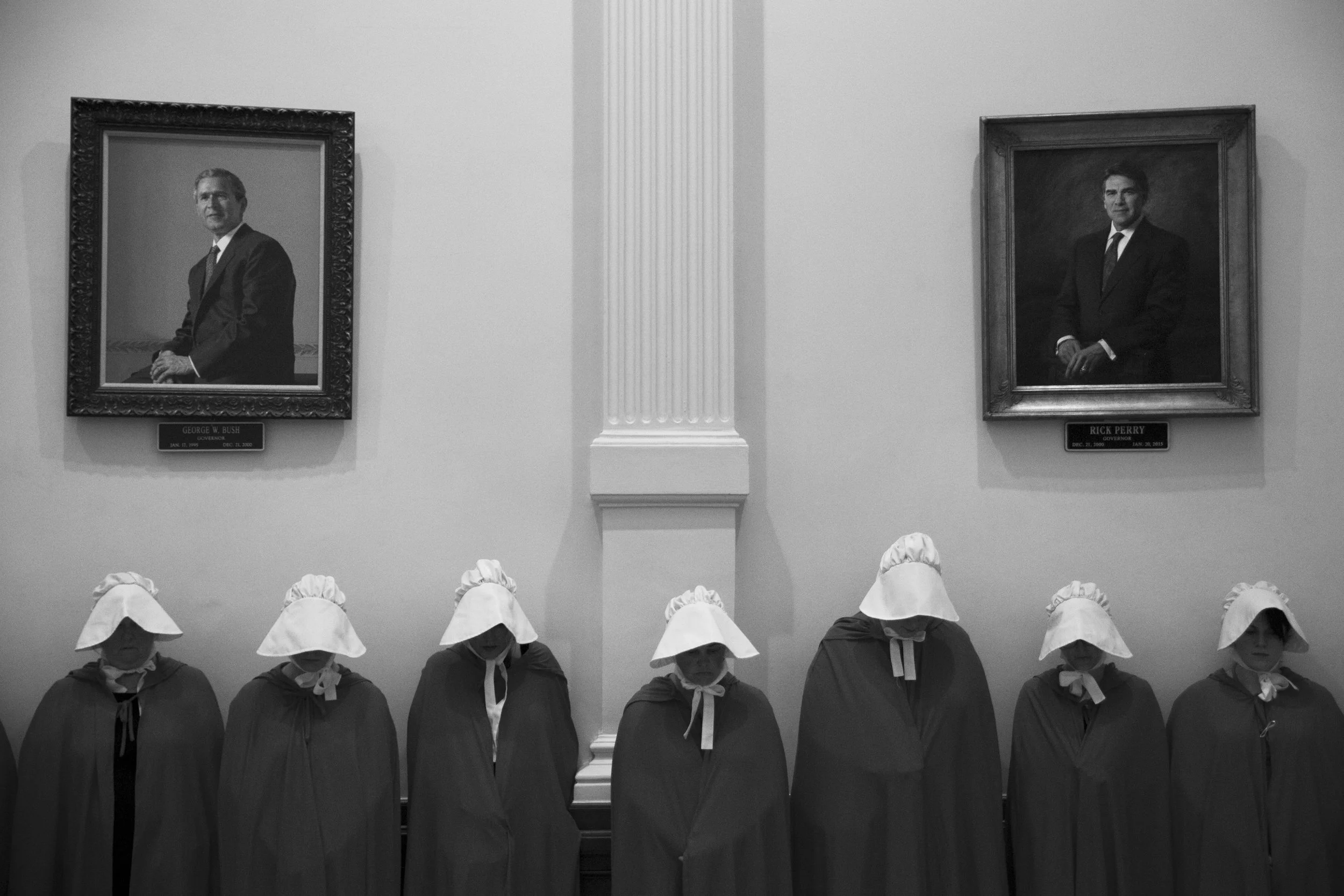
Abortion on the Border
A group of women dressed as characters from the book The Handmaid’s Tale participate in a protest for reproductive rights at the Texas State Capitol for the first day of the legislature’s special session on July 18, 2017 in Austin, Texas. “While the Texas legislature is in session, no woman’s health is safe,” Stephanie Martin, one of the handmaids, said. “People are confronted with wondering, ‘why are you bringing this terrible story to life?’ They actually talk to us and ask questions when we wear the capes.”
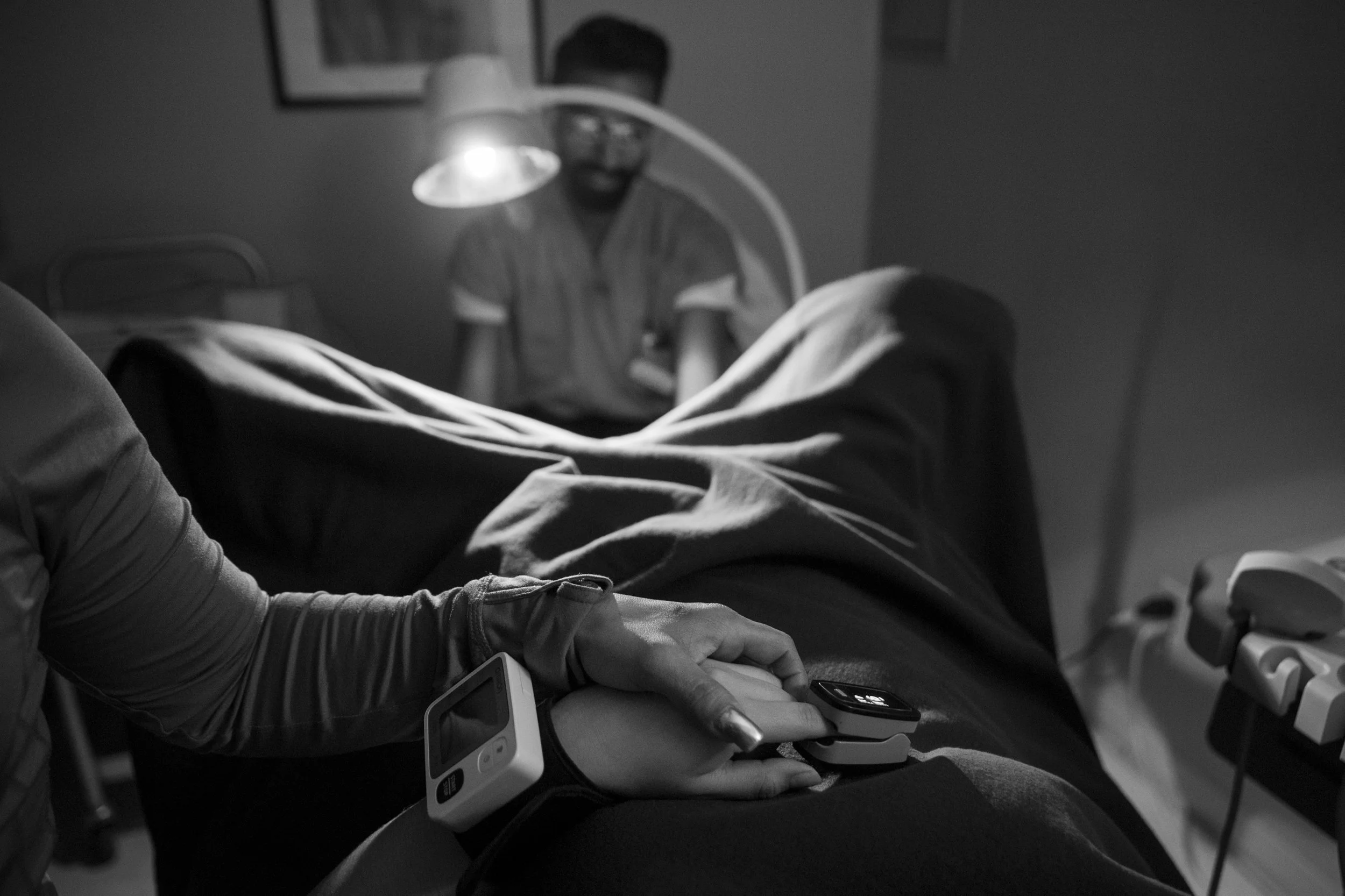
Abortion on the Border
Jess, 25, holds hands with her mother Aisme as she prepares to undergo an abortion performed by Dr. Bhavik Kumar at the Whole Woman's Health clinic in San Antonio, Texas on June 6, 2017. Aisme drove Jess from their home in Del Rio to the clinic, because the illegal abortion pills that they made two trips to Mexico to get did not work. They drove 300 miles roundtrip to get to the abortion clinic and had to take time off of work to get the procedure. Jess was out of work for two weeks as a result. Aisme twice drove Jess to Mexico to buy misoprostol pills, an ulcer medication known to induce abortions, in order to avoid having to drive to San Antonio for the costly procedure. Using misoprostol to induce an abortion at home is illegal, but in Jess' case the pills did not work. Dr. Kumar suggested that, because the Mexican pharmacy was not regulated, she may have not gotten the same type or strength medicine she thought she received. Although she was 9 weeks along and could still opt for a medical abortion at Whole Woman's Health, she and Dr. Kumar decided that, because the misoprostol from Mexico did not work, she would be a better candidate for a surgical abortion. Aisme and Jess' full names are being withheld for their privacy.
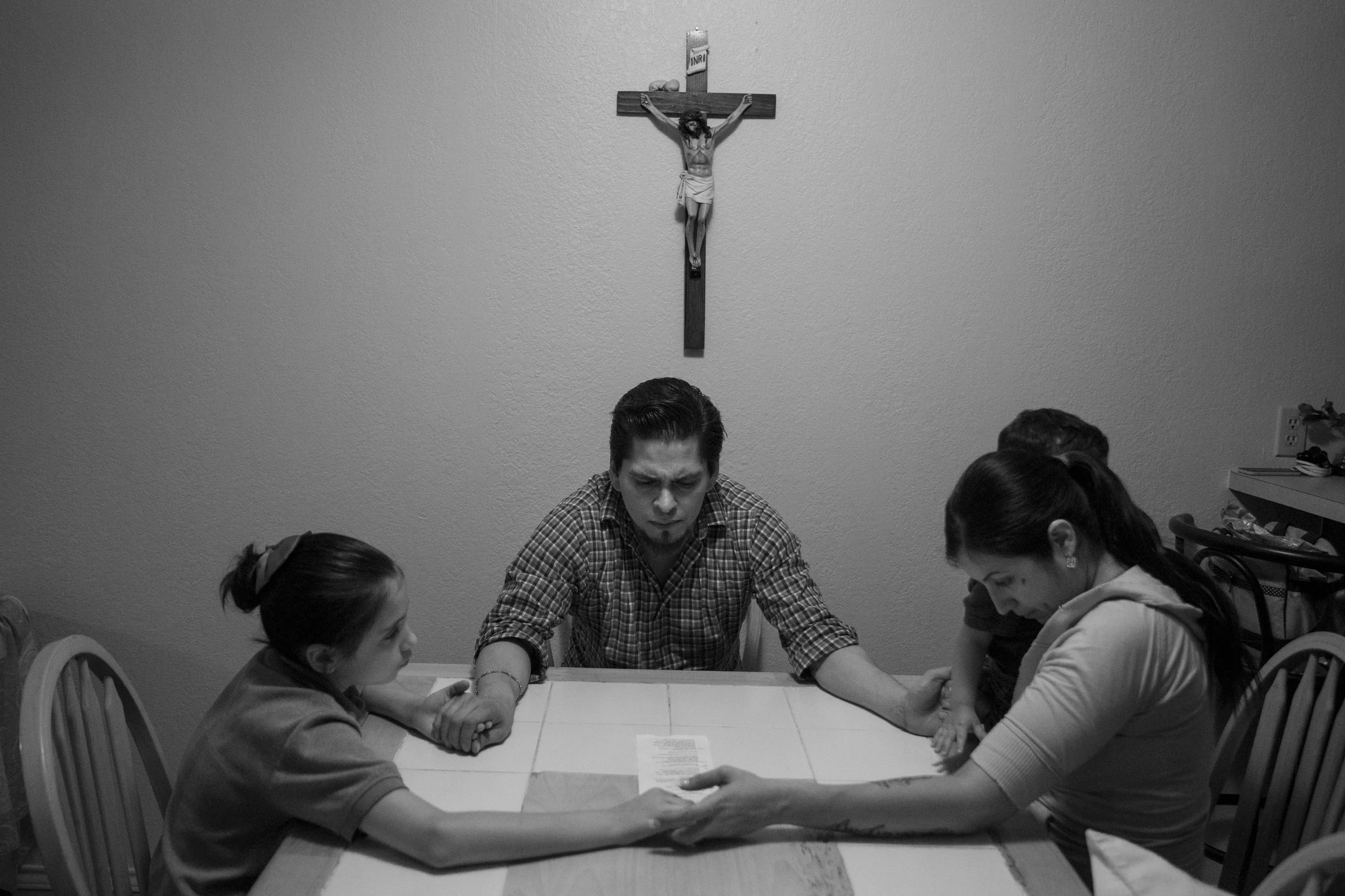
Abortion on the Border
Orlando Sanchez leads the family's nightly prayer as Delilah, Samson, and Mercedes Soto sit with him at the dinner table in their home in Edinburg, Texas on April 10, 2017. Before becoming a pro-life advocate, Mercedes made several attempts to self-induce an abortion. Once she decided to go through with the pregnancy and reconnected with Orlando, he carried the small rubber fetus, which is perched on the crucifix, in his pocket for the duration of the pregnancy as a way to bond with the baby. "If I can keep my baby after being gang-raped, anyone can," Mercedes said. "You got pregnant on a bad date, or with somebody you love? There's just no excuse. If you lay with a man and get pregnant, that's your fault. To murder your unborn baby is a sin against humanity."
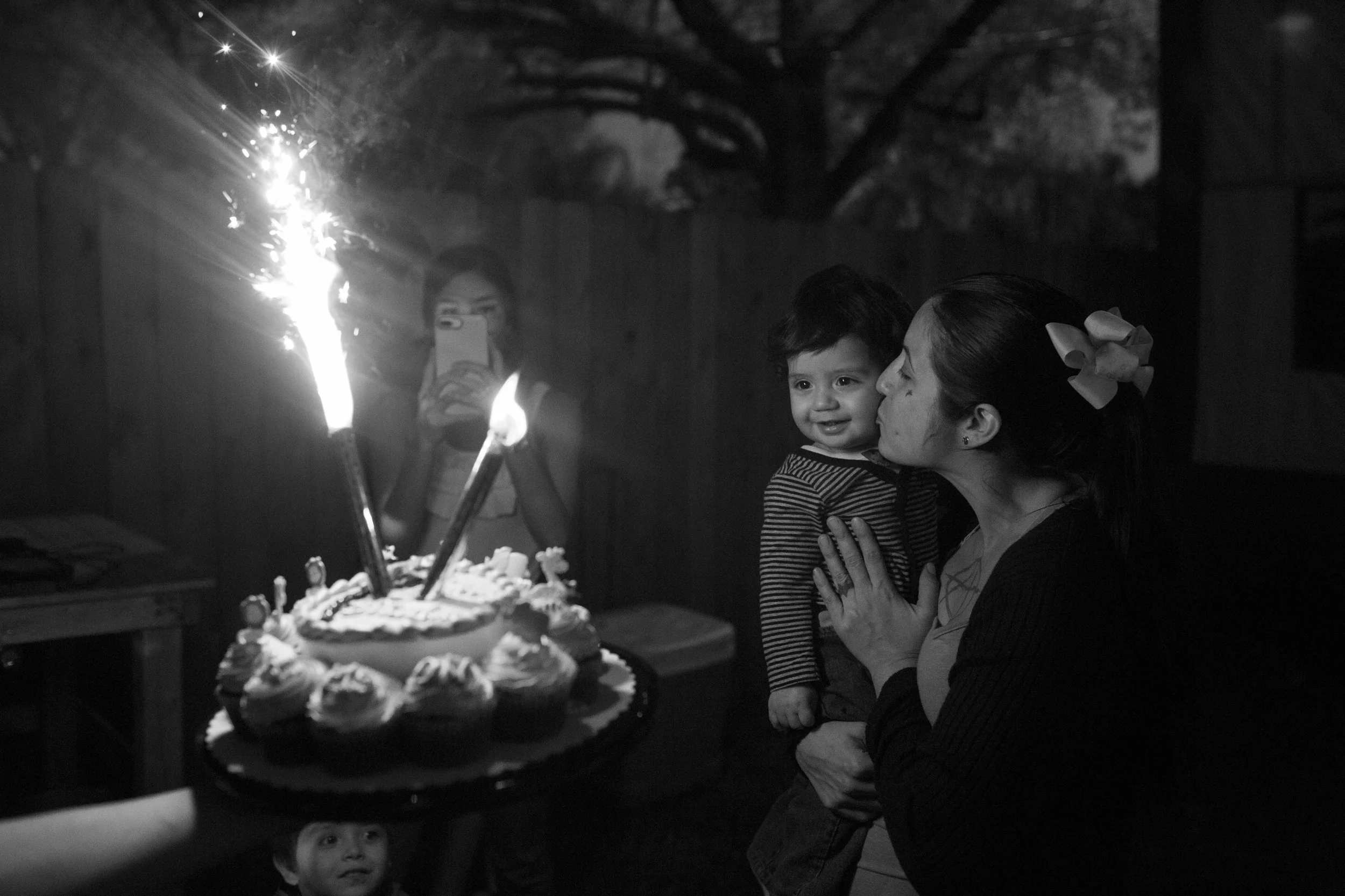
Abortion on the Border
Orlando Sanchez holds a Noah's Ark themed birthday cake as Mercedes Soto holds her son Samson during his first birthday party, held on the 44th anniversary of Roe v. Wade, in their backyard in Edinburg, Texas on January 22, 2017. When self-inducing failed, Mercedes sought an abortion after being gang-raped and becoming homeless. However, she decided to go through with the pregnancy when she met a pro-life sidewalk counselor as she walked into the Whole Woman's Health in nearby McAllen, Texas.

Abortion on the Border
Mercedes Soto, a former gang member who got pregnant after being assaulted, holds her son Samson at their home in Edinburg, Texas on October 18, 2016. "My heart burns with fire. I fought for my son's life and he saved my soul," she said. She tried to self-abort through pills, toxic teas, and other methods, but none worked. Still seeking an abortion, she went to the McAllen Whole Woman's Health abortion clinic when a pro-life sidewalk counselor convinced her to keep the pregnancy. She has since become a pro-life activist, taking Samson and his sister Delilah to abortion protests.

Abortion on the Border
Kristen, 18, waits five hours for a bus back to Del Rio, Texas at the Greyhound Station in downtown San Antonio, Texas after getting a medical abortion at the Whole Woman's Health clinic on March 17, 2017. When her period was a week late, she and her 20-year-old boyfriend "freaked out." They had been together for about three months and both are in the military. They did not make enough money to afford a child and, Kristen said, were not ready for parenthood. She has dreams of using the money from her military service to go to college and become a psychologist. Because more than half of Texas' abortion clinics have closed, many women find they have to travel extensively to obtain the procedure.
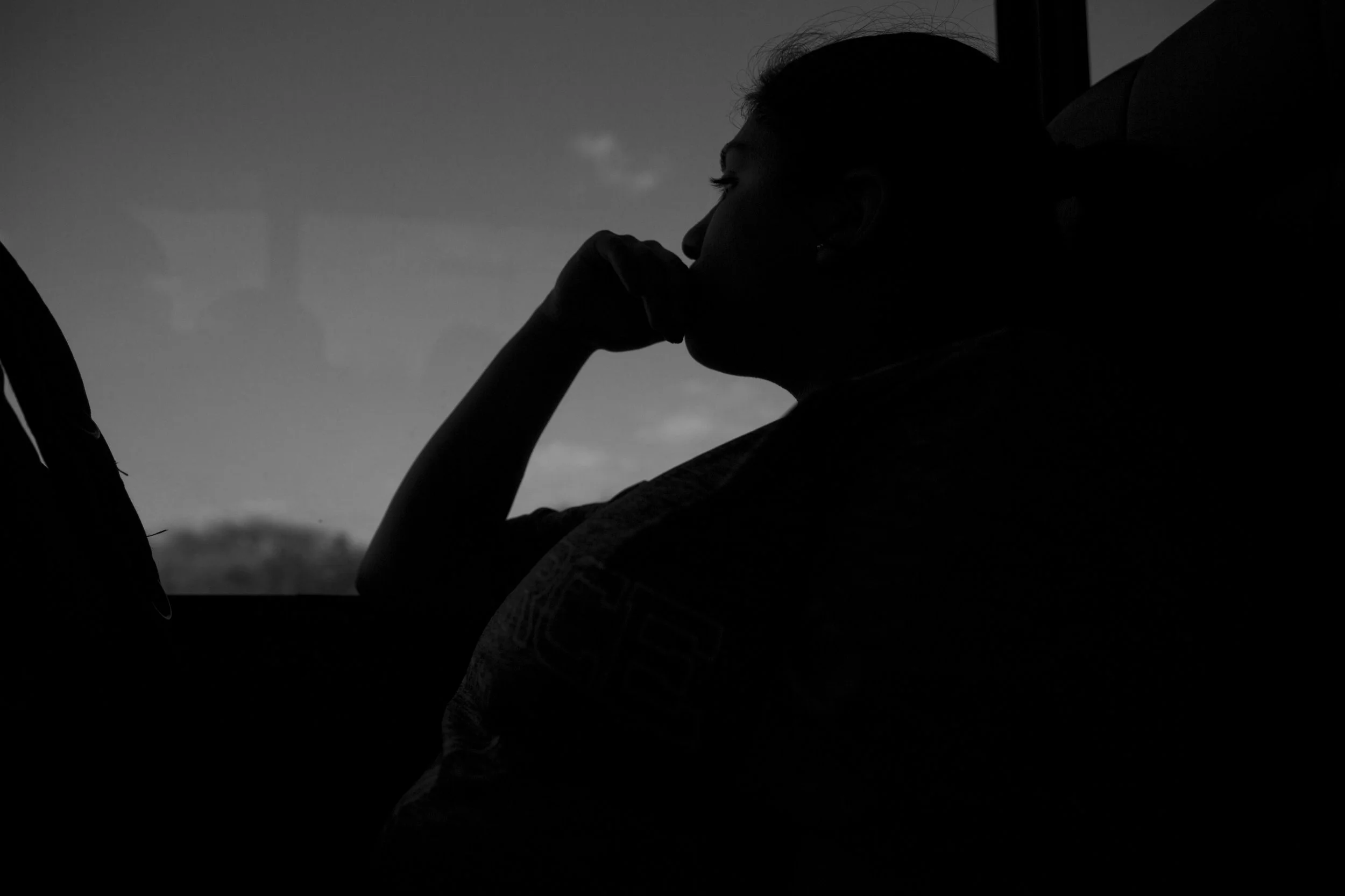
Abortion on the Border
Kristen, 18, looks out the window of a Greyhound bus during the over four-hour-long ride back to Del Rio, Texas after getting a medical abortion at the Whole Woman's Health clinic in San Antonio on March 17, 2017. She did not know to tell the clinic that she came from farther than 100 miles, so she had to endure the 24-hour waiting period that Texas law requires between the consultation appointment and the abortion. Because of that she had to spend over $200 on a hotel room and, because she is in the Air Force and does not have a car, she had to take a nine hour round-trip bus ride from Del Rio to the closest clinic in San Antonio. "The only thing that sucks is having to wait two days," Kristen said. "I've been through some serious stuff in my life. When I was 10, my father killed my mother. So, no, this isn't going to destroy me, no way." Her last name is withheld for her privacy.
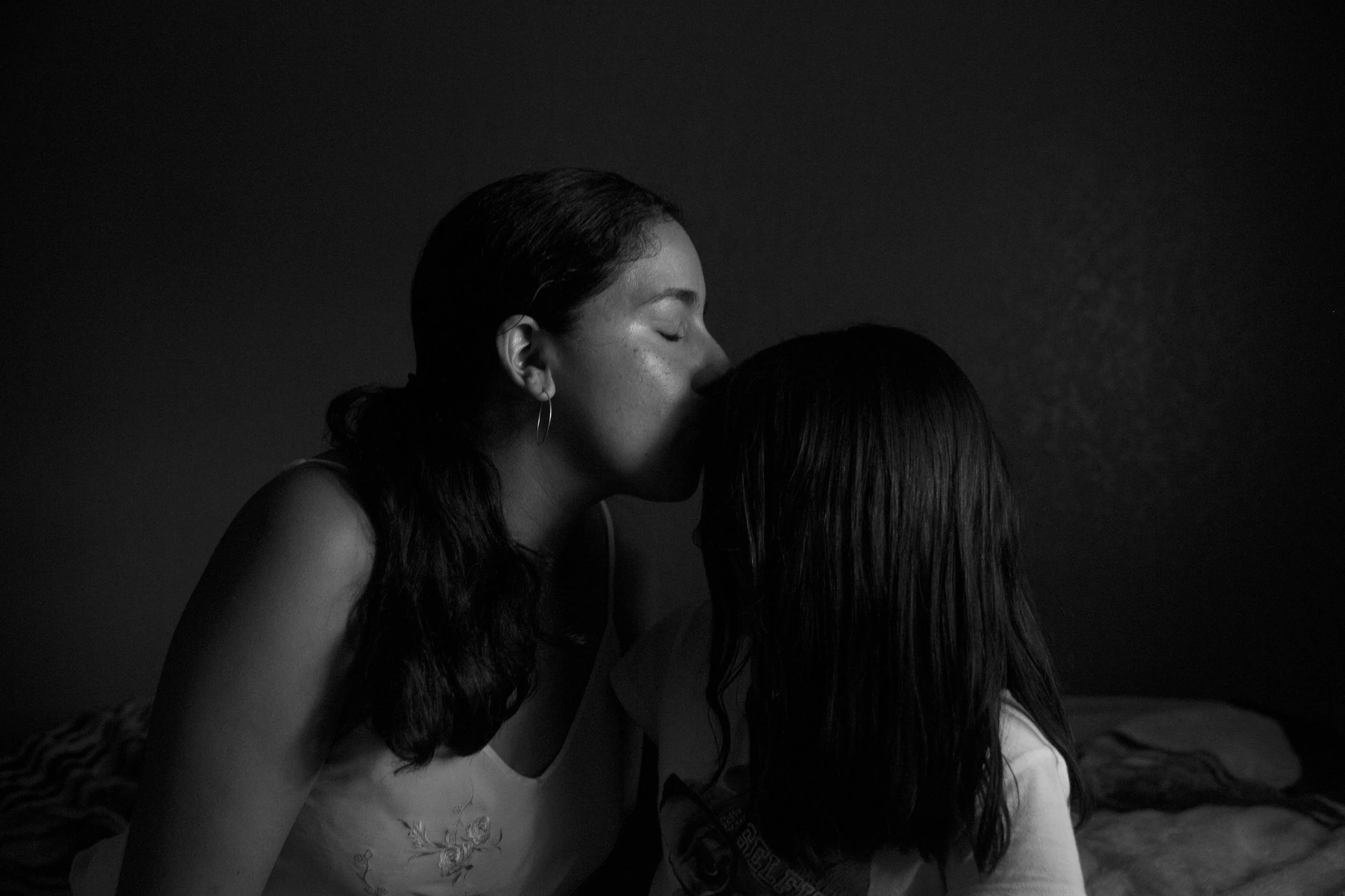
Abortion on the Border
Sofia Peña sits for a portrait in a bedroom with her daughter at her home in McAllen, Texas on May 18, 2017. Sofia was in a rocky relationship with a boyfriend when she became pregnant with her daughter. She desperately wanted an abortion, but her boyfriend was vehemently against it, so she continued the pregnancy. She took to parenting, much to her surprise, but struggled to raise her daughter without the father's consistent involvement. Before being able to get out of the relationship, she became pregnant again. This time she got an abortion, realizing she was not able to financially support a second child, having a cashier's job. Now she helps run La Frontera Fund, which helps to fund travel to and from clinics for women seeking abortions who cannot afford them. "Being in the Rio Grande Valley, everyone is very Catholic," Sofia said. "We're not unique in that way, but it does present problems that are very specific to really religious areas, such as the shame around women's sexuality in general. We don't talk about sex. Families are not going to tell their girls to get birth control. Support is really necessary and stigma is a really big deal here...even for people like me. In high school I already knew about contraceptives...but I wasn't really taught about the emotional and physical abuse that led to me not really standing up for my rights, even though I knew them." Her daughter's name is withheld for her privacy.
Abortion on the Border
A procedure room in the closed Whole Woman's Health abortion clinic in Austin, Texas shortly after the Supreme Court of the United States' 5-3 ruling on the Whole Woman's Health v. Hellerstedt case regarding Texas' House Bill 2 on June 27, 2016. This was one of many abortion clinics to close across the state because of House Bill 2. On the wall there is a Sojourner Truth quote that reads, "The truth is powerful and it prevails."
Abortion on the Border
Providers and staff with Whole Woman's Health, plaintiffs in the Whole Woman's Health v. Hellerstedt case, and women's reproductive and abortion rights advocates react to the Supreme Court of the United States' ruling in a closed Whole Woman's Health clinic in Austin, Texas on June 27, 2016. The plaintiffs argued that Texas' House Bill 2, which closed dozens of abortion clinics across Texas including this one, was unconstitutional. The Supreme Court agreed and ruled that Texas cannot place restrictions on abortion providers that pose an undue burden on women trying to access abortions. Upon hearing what is being considered the nation's most significant abortion ruling in a generation, those gathered said they hoped that closed clinics, such as this one, would be able to someday reopen because of this ruling.
Abortion on the Border
Mercedes Soto cries as she sings a hymn into a megaphone while she and more than a thousand other anti-abortion protestors face off with abortion rights advocates in the intersection in front of the Whole Woman's Health abortion clinic in McAllen, Texas on January 21, 2017. Mercedes, formerly a member of a gang in the Rio Grande Valley, was gang-raped by a rival gang. When she discovered she was pregnant because of the rape, she tried to self abort by ingesting illegal abortion pills, drinking toxic teas, and even having fellow gang members punch her in the stomach. When nothing worked, she went to Whole Woman's Health to get an abortion. She was stopped on her way in by a pro-life sidewalk counselor. Mercedes decided to keep the pregnancy and raise the child as her own. Now she tries to convince other women to do the same.
Abortion on the Border
Kristeena Banda, clinic director, closes the exterior metal gates that protect the front door of the Whole Woman's Health abortion clinic as over a thousand people protest in front of the clinic in McAllen, Texas on January 21, 2017. At one point, the McAllen clinic closed because of House Bill 2, but it was granted a temporary injunction by a federal judge to stay open, because it was the only clinic in the Rio Grande Valley.
Abortion on the Border
Dr. Bhavik Kumar, one of few abortion providers in Texas, speaks to Marie before providing her a surgical abortion at the Whole Woman's Health in San Antonio, Texas on February 23, 2017. "I am a single mother to a special needs child," Marie said. "It takes a village to raise my son, so I can't imagine bringing another child into that...I feel bad about this decision, but it is for the best. It is for my son." More than 60 percent of women seeking abortions are already mothers. Marie's last name is withheld for her privacy.
Abortion on the Border
Yolanda Perez Rittimann, a volunteer at Allied Women's Center, sprays holy water on the television they use to show a graphic anti-abortion video, which includes medically incorrect information, in order to discourage women from getting an abortion. Crisis pregnancy centers are religious organizations that usually do not have medical professionals, but do provide pregnancy tests and ultrasounds and discourage women from getting abortions. In Texas, some of them, not including Allied Women's Center, receive state funding.
Abortion on the Border
Mercedes Soto prays with Patricia De Leon, who was due to give birth in September, outside the Sacred Heart Church in McAllen, Texas on June 1, 2017. They were praying for Patricia to find a safer and more secure place to live by the time the child is born in the fall, Patricia said. Mercedes helped Patricia decide not to have a second abortion, but rather to keep the baby, Patricia said. Mercedes gives her car rides to appointments, emotional support, food, and other forms of assistance. In return, she goes with Mercedes to pro-life rallies and protests as an example of what life is like as a saved woman.
Abortion on the Border
A young girl holds her cousin after attending a community gathering, called a junta, hosted by the National Latina Institute for Reproductive Health, or NLIRH, in La Fruita Colonia in the Rio Grande Valley region of Texas on September 15, 2016. Although abortion is often not explicitly discussed due to the stigma surrounding the topic, education on reproductive healthcare and contraception is a priority for women and girls in these communities. Increasing education and access to healthcare through programs like this one reduces demand for abortions later, advocates say. "Because they don't feel valued, they don't feel that they have power. We educate them, so they can discover the power they have," Lucy Felix, an NLIRH promotora, said of the women of the Rio Grande Valley. During a speech in Spanish at the junta that day, Lucy said: "When the clinics close down, that effects us. When we hear that a woman is denied her right to make a decision about her body, this affects us, because that means that they are not respecting our rights...We know that when our communities do not have access to healthcare services that affects our families. That hurts our mothers, that hurts working women like all of us...We know that there are barriers, but we also know that our voice matters. That our voice has to be heard." Their names are withheld for their privacy.
Abortion on the Border
A pro-choice message is graffitied onto a pro-life sign in the field behind the Whole Woman's Health abortion clinic in McAllen, Texas on April 10, 2017. Anti-abortion signage is prevalent on signs, cars, and elsewhere throughout the Rio Grande Valley, a region that sits along the border between Texas and Mexico. The tension over abortion in the largely Catholic, low-income community is palpable.
Abortion on the Border
A group of women dressed as characters from the book The Handmaid’s Tale participate in a protest for reproductive rights at the Texas State Capitol for the first day of the legislature’s special session on July 18, 2017 in Austin, Texas. “While the Texas legislature is in session, no woman’s health is safe,” Stephanie Martin, one of the handmaids, said. “People are confronted with wondering, ‘why are you bringing this terrible story to life?’ They actually talk to us and ask questions when we wear the capes.”
Abortion on the Border
Jess, 25, holds hands with her mother Aisme as she prepares to undergo an abortion performed by Dr. Bhavik Kumar at the Whole Woman's Health clinic in San Antonio, Texas on June 6, 2017. Aisme drove Jess from their home in Del Rio to the clinic, because the illegal abortion pills that they made two trips to Mexico to get did not work. They drove 300 miles roundtrip to get to the abortion clinic and had to take time off of work to get the procedure. Jess was out of work for two weeks as a result. Aisme twice drove Jess to Mexico to buy misoprostol pills, an ulcer medication known to induce abortions, in order to avoid having to drive to San Antonio for the costly procedure. Using misoprostol to induce an abortion at home is illegal, but in Jess' case the pills did not work. Dr. Kumar suggested that, because the Mexican pharmacy was not regulated, she may have not gotten the same type or strength medicine she thought she received. Although she was 9 weeks along and could still opt for a medical abortion at Whole Woman's Health, she and Dr. Kumar decided that, because the misoprostol from Mexico did not work, she would be a better candidate for a surgical abortion. Aisme and Jess' full names are being withheld for their privacy.
Abortion on the Border
Orlando Sanchez leads the family's nightly prayer as Delilah, Samson, and Mercedes Soto sit with him at the dinner table in their home in Edinburg, Texas on April 10, 2017. Before becoming a pro-life advocate, Mercedes made several attempts to self-induce an abortion. Once she decided to go through with the pregnancy and reconnected with Orlando, he carried the small rubber fetus, which is perched on the crucifix, in his pocket for the duration of the pregnancy as a way to bond with the baby. "If I can keep my baby after being gang-raped, anyone can," Mercedes said. "You got pregnant on a bad date, or with somebody you love? There's just no excuse. If you lay with a man and get pregnant, that's your fault. To murder your unborn baby is a sin against humanity."
Abortion on the Border
Orlando Sanchez holds a Noah's Ark themed birthday cake as Mercedes Soto holds her son Samson during his first birthday party, held on the 44th anniversary of Roe v. Wade, in their backyard in Edinburg, Texas on January 22, 2017. When self-inducing failed, Mercedes sought an abortion after being gang-raped and becoming homeless. However, she decided to go through with the pregnancy when she met a pro-life sidewalk counselor as she walked into the Whole Woman's Health in nearby McAllen, Texas.
Abortion on the Border
Mercedes Soto, a former gang member who got pregnant after being assaulted, holds her son Samson at their home in Edinburg, Texas on October 18, 2016. "My heart burns with fire. I fought for my son's life and he saved my soul," she said. She tried to self-abort through pills, toxic teas, and other methods, but none worked. Still seeking an abortion, she went to the McAllen Whole Woman's Health abortion clinic when a pro-life sidewalk counselor convinced her to keep the pregnancy. She has since become a pro-life activist, taking Samson and his sister Delilah to abortion protests.
Abortion on the Border
Kristen, 18, waits five hours for a bus back to Del Rio, Texas at the Greyhound Station in downtown San Antonio, Texas after getting a medical abortion at the Whole Woman's Health clinic on March 17, 2017. When her period was a week late, she and her 20-year-old boyfriend "freaked out." They had been together for about three months and both are in the military. They did not make enough money to afford a child and, Kristen said, were not ready for parenthood. She has dreams of using the money from her military service to go to college and become a psychologist. Because more than half of Texas' abortion clinics have closed, many women find they have to travel extensively to obtain the procedure.
Abortion on the Border
Kristen, 18, looks out the window of a Greyhound bus during the over four-hour-long ride back to Del Rio, Texas after getting a medical abortion at the Whole Woman's Health clinic in San Antonio on March 17, 2017. She did not know to tell the clinic that she came from farther than 100 miles, so she had to endure the 24-hour waiting period that Texas law requires between the consultation appointment and the abortion. Because of that she had to spend over $200 on a hotel room and, because she is in the Air Force and does not have a car, she had to take a nine hour round-trip bus ride from Del Rio to the closest clinic in San Antonio. "The only thing that sucks is having to wait two days," Kristen said. "I've been through some serious stuff in my life. When I was 10, my father killed my mother. So, no, this isn't going to destroy me, no way." Her last name is withheld for her privacy.
Abortion on the Border
Sofia Peña sits for a portrait in a bedroom with her daughter at her home in McAllen, Texas on May 18, 2017. Sofia was in a rocky relationship with a boyfriend when she became pregnant with her daughter. She desperately wanted an abortion, but her boyfriend was vehemently against it, so she continued the pregnancy. She took to parenting, much to her surprise, but struggled to raise her daughter without the father's consistent involvement. Before being able to get out of the relationship, she became pregnant again. This time she got an abortion, realizing she was not able to financially support a second child, having a cashier's job. Now she helps run La Frontera Fund, which helps to fund travel to and from clinics for women seeking abortions who cannot afford them. "Being in the Rio Grande Valley, everyone is very Catholic," Sofia said. "We're not unique in that way, but it does present problems that are very specific to really religious areas, such as the shame around women's sexuality in general. We don't talk about sex. Families are not going to tell their girls to get birth control. Support is really necessary and stigma is a really big deal here...even for people like me. In high school I already knew about contraceptives...but I wasn't really taught about the emotional and physical abuse that led to me not really standing up for my rights, even though I knew them." Her daughter's name is withheld for her privacy.

















